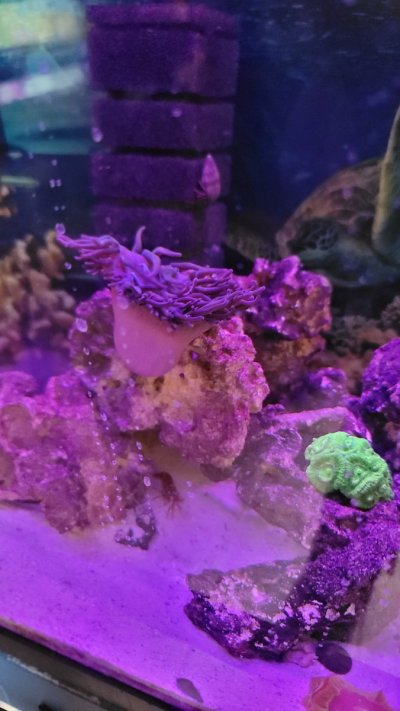Navigation
Install the app
How to install the app on iOS
Follow along with the video below to see how to install our site as a web app on your home screen.
Note: This feature may not be available in some browsers.
More options
You are using an out of date browser. It may not display this or other websites correctly.
You should upgrade or use an alternative browser.
You should upgrade or use an alternative browser.
Torch problem
- Thread starter tazzette
- Start date
- Tagged users None
Crabs McJones
I'm so shi-nay
View Badges
Excellence Award
Reef Tank 365
Article Contributor
Moderator Emeritus
Hospitality Award
Reef Tank 365 Boss
Wisco Reefers
My Tank Thread
yes, and eventually the tentacles will start to shrink as it consumes itselfWould this Cause my bubble tip to have no more bubbles.
Consumes itself ?yes, and eventually the tentacles will start to shrink as it consumes itself
Crabs McJones
I'm so shi-nay
View Badges
Excellence Award
Reef Tank 365
Article Contributor
Moderator Emeritus
Hospitality Award
Reef Tank 365 Boss
Wisco Reefers
My Tank Thread
Correct, when anemones aren't provided proper lighting, they'll start consuming themselves to stay aliveConsumes itself ?
I'm take everything people are telling me I know now I need to get better lights for my coral sorry if you think I'm not leasing but I mMaybe do some research yourself on the correct lighting for corals. You do not seem to be accepting of anyone’s help
check out the nicrew 100w light on amazon, assuming you are in Sudbury Canada, this is the cheapest light you will get in Canada with the best 'bang for buck'. This light will grow any type of coral you want, I have this on my 32 gallon.It is a 35g
Lighting is one of the most crucial factors for the health and growth of corals in a reef aquarium. Corals are photosynthetic organisms, which means they rely on light for energy production through a symbiotic relationship with photosynthetic algae called zooxanthellae that live within their tissues.
Here are some key factors to consider when selecting the correct lighting for a reef aquarium:
Here are some key factors to consider when selecting the correct lighting for a reef aquarium:
- Intensity: Corals require adequate light intensity to support photosynthesis. The intensity of light is typically measured in PAR (Photosynthetically Active Radiation) or PUR (Photosynthetically Usable Radiation). Different species of corals have varying light intensity requirements, so it's essential to research the specific needs of the corals you plan to keep.
- Spectrum: The spectrum of light is also crucial. Corals utilize different wavelengths of light for various biological processes. Generally, a lighting system that provides a full spectrum, including blue, violet, and red wavelengths, is beneficial for coral growth and coloration. LED (Light Emitting Diode) lights are popular for reef aquariums because they allow for customization of the light spectrum.
- Duration: Providing a consistent lighting schedule mimicking natural daylight cycles is important. Most reef aquariums use a lighting schedule of around 8 to 12 hours of light per day. Some aquarists simulate sunrise and sunset by gradually increasing and decreasing light intensity over time.
- Uniformity: It's important to ensure that light is evenly distributed throughout the aquarium to prevent shadowing and ensure all corals receive adequate light. This can be achieved by using multiple light sources positioned strategically over the aquarium or by using reflectors to direct light onto shadowed areas.
- Lighting Technology: There are various lighting technologies available for reef aquariums, including metal halide, fluorescent, and LED lights. LED lighting has become increasingly popular due to its energy efficiency, customizable spectrum, and long lifespan.
- Lighting Control: Many modern lighting systems come with programmable controllers that allow users to customize light intensity, spectrum, and timing. This level of control is beneficial for creating optimal lighting conditions for different types of corals and for replicating natural lighting variations.
- Acclimation: When introducing corals to a new aquarium or changing lighting conditions, it's essential to acclimate them gradually to prevent stress or bleaching. This involves slowly increasing the intensity and duration of light over a period of several weeks.
Here’s some advice if you’re open to it. Return the corals to the store where you bought them from. Go out and research and purchase a light suited for corals. Understand how much par it will put out, then start researching some beginner friendly corals that you like. Then slowly start adding some. That should set you up for success.
And a shout out to Sudbury. I’m from Kirkland Lake
And a shout out to Sudbury. I’m from Kirkland Lake
Similar threads
- Replies
- 8
- Views
- 157















